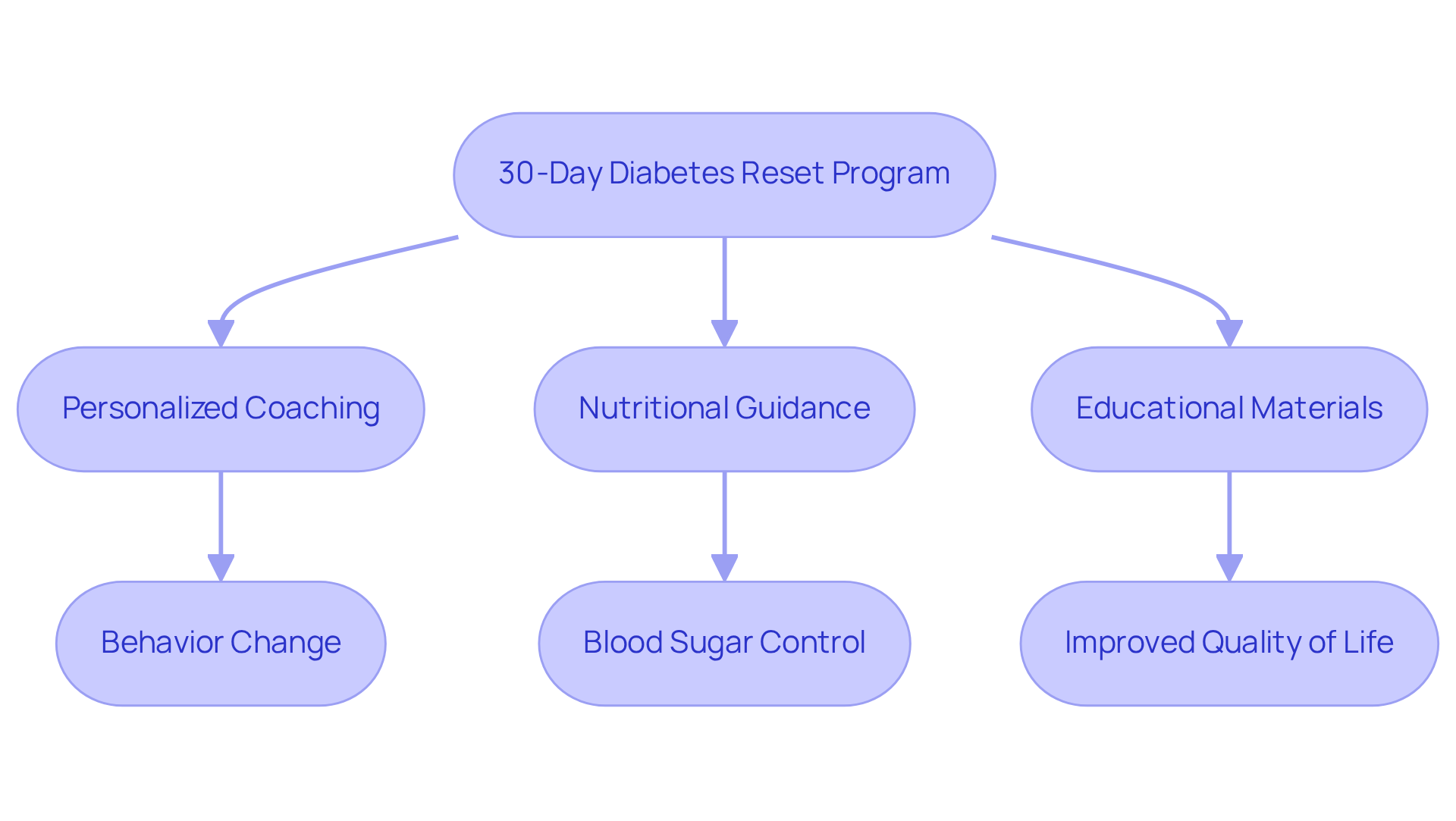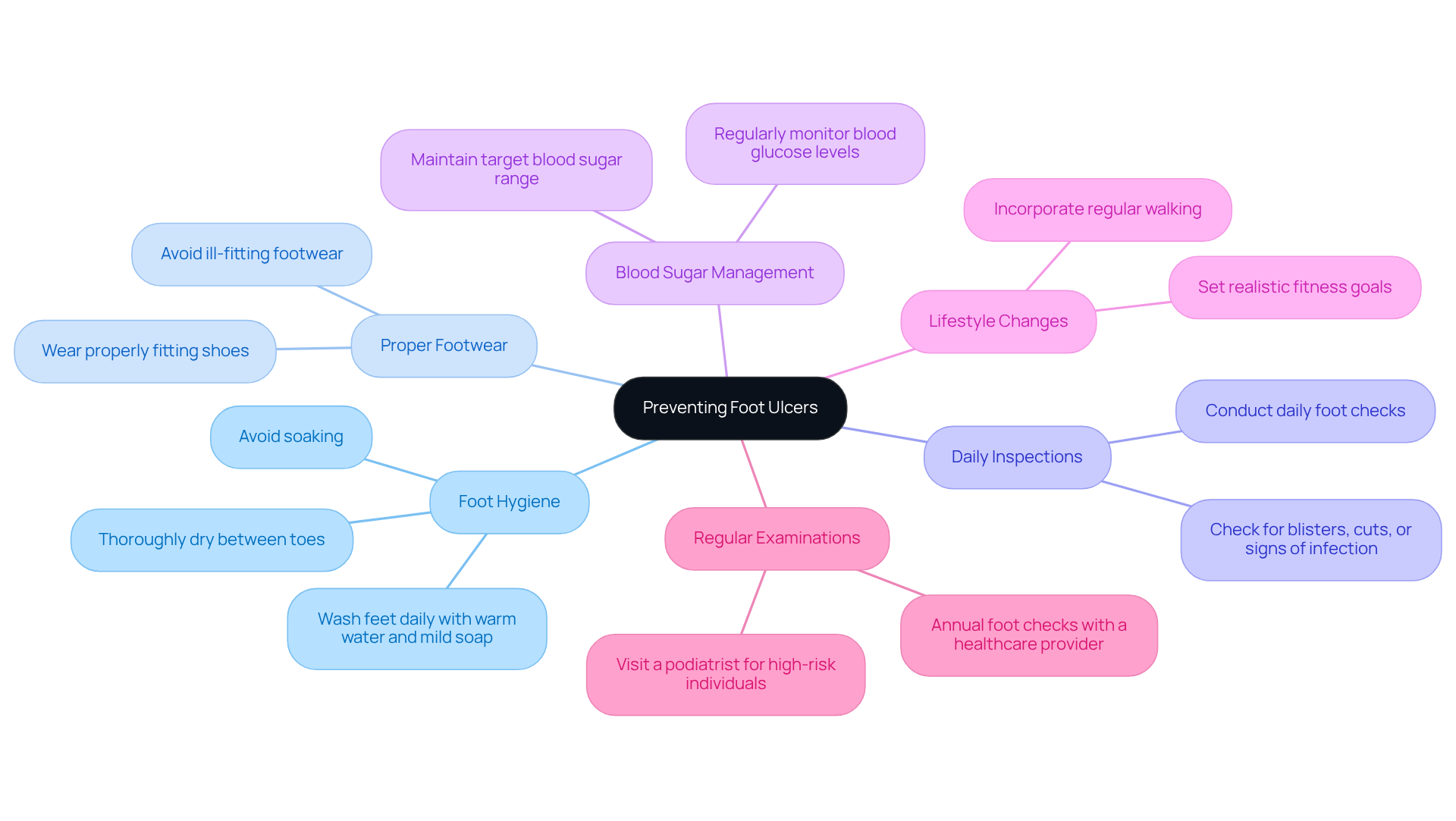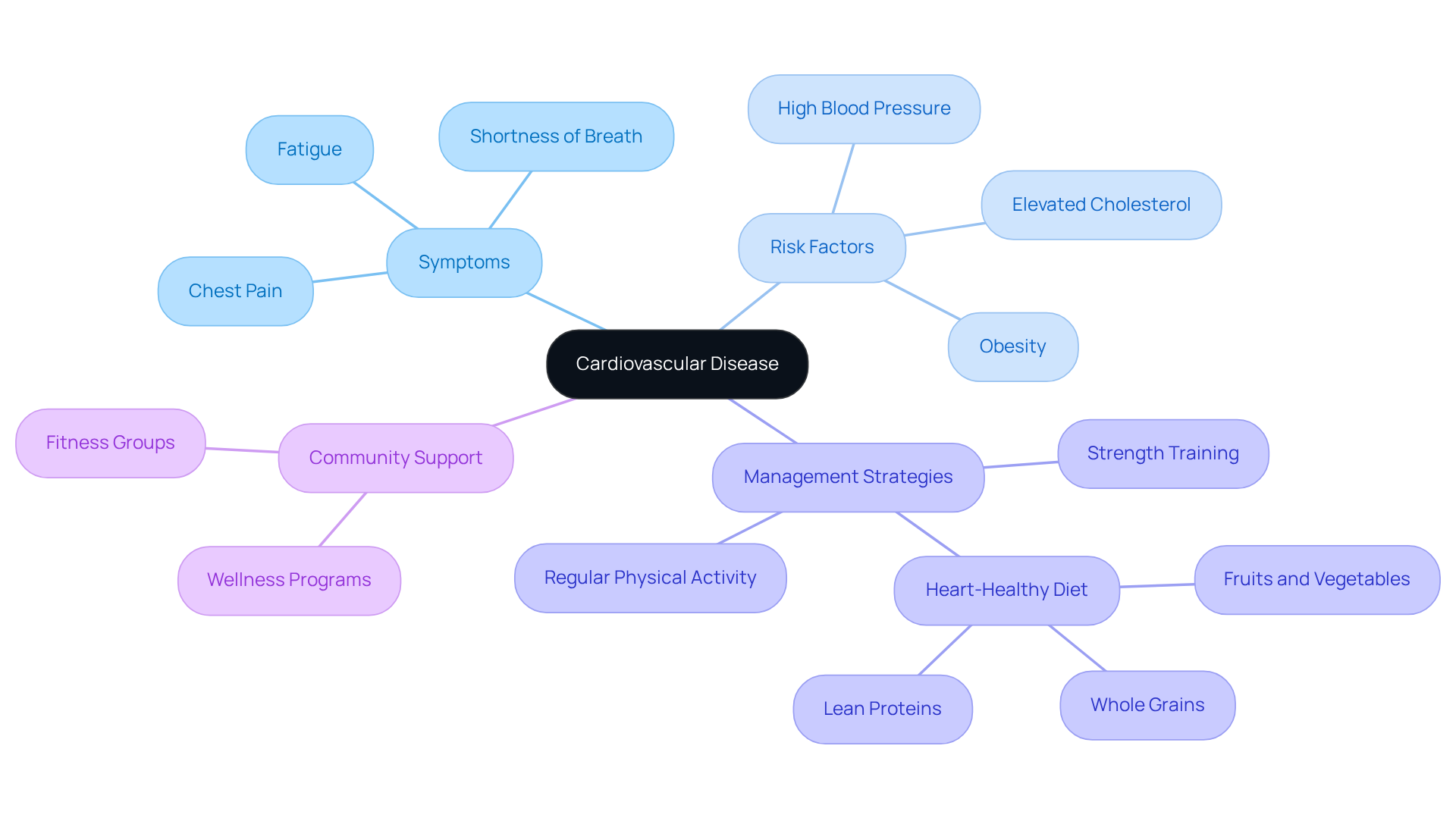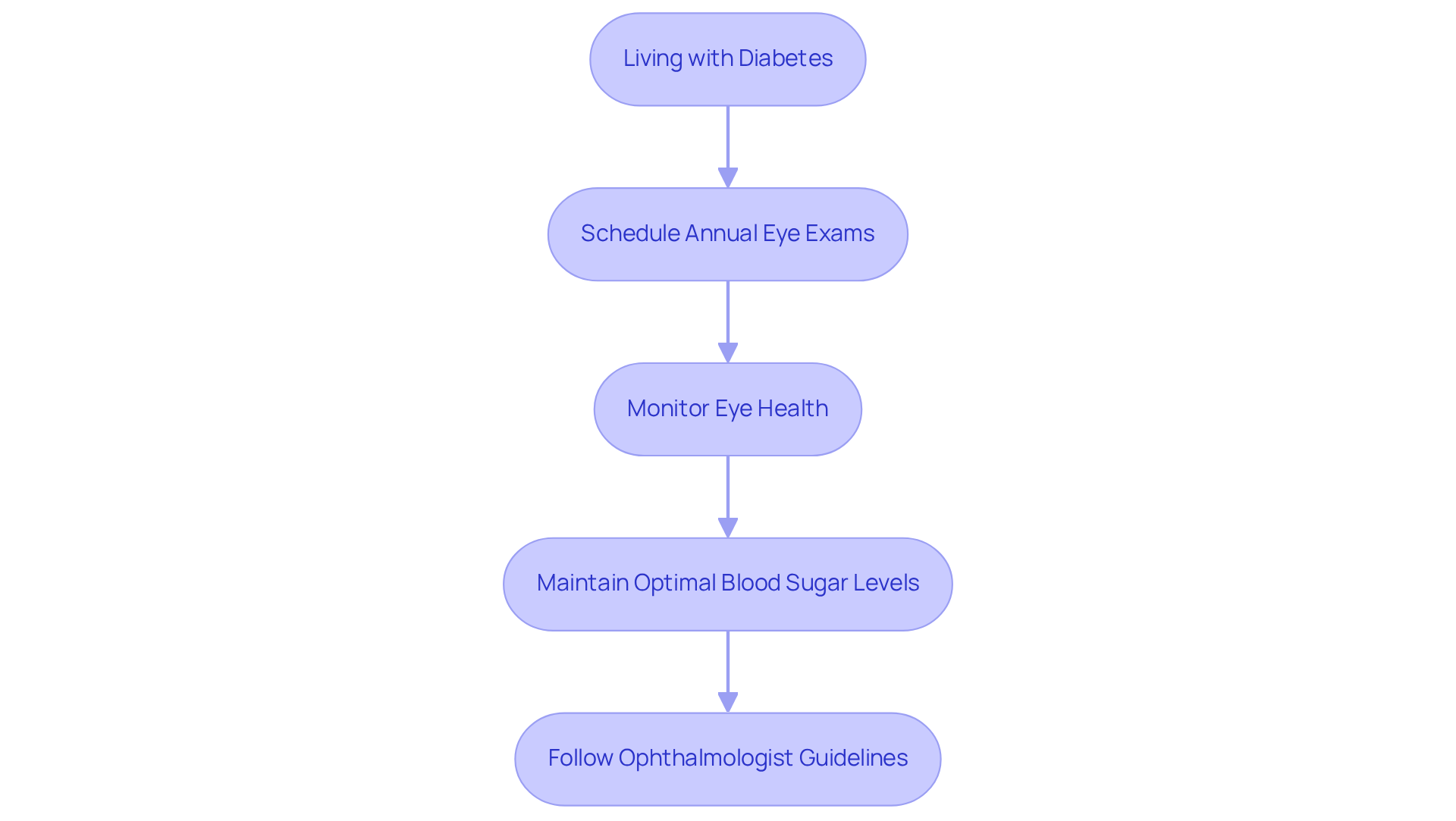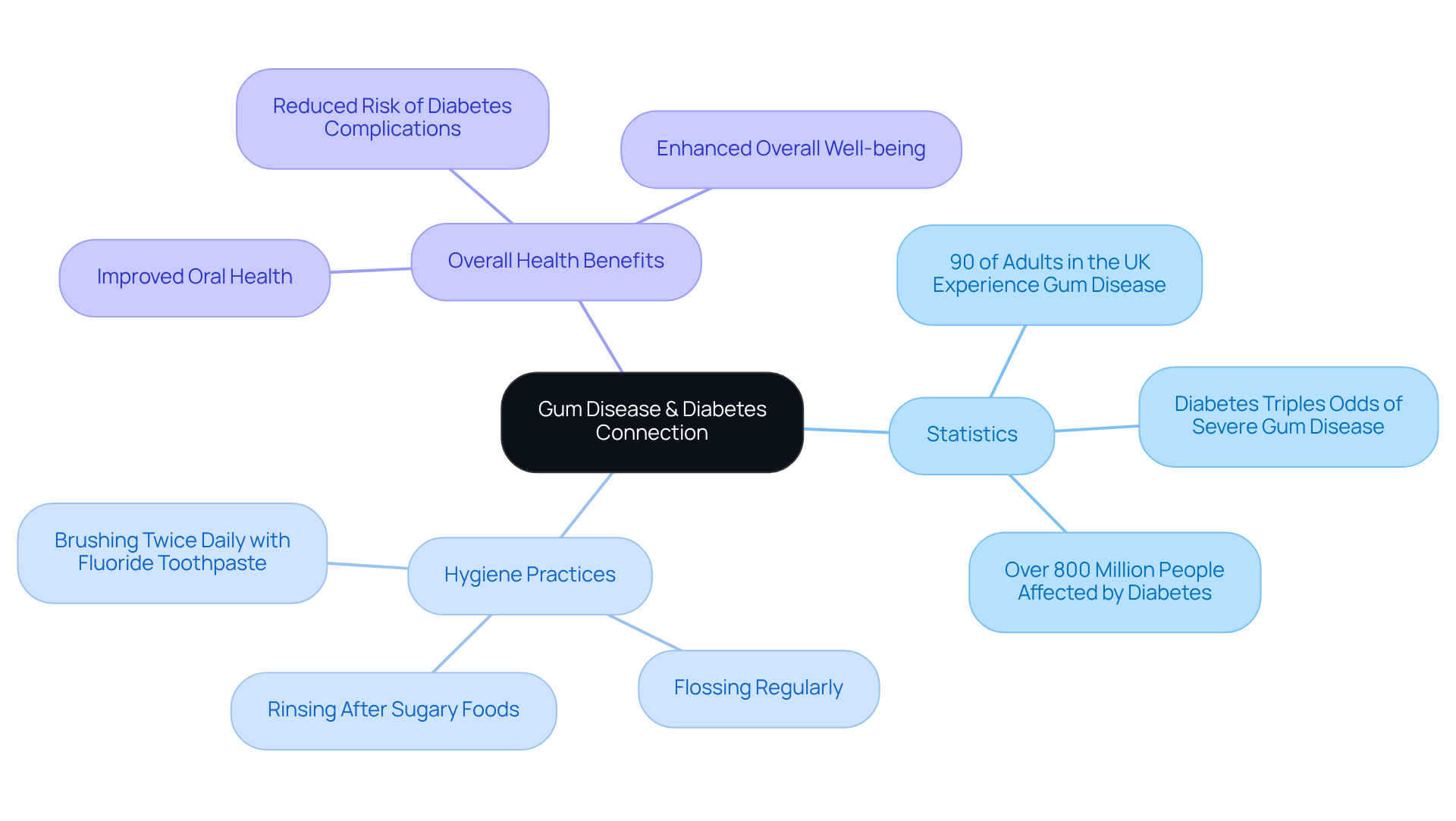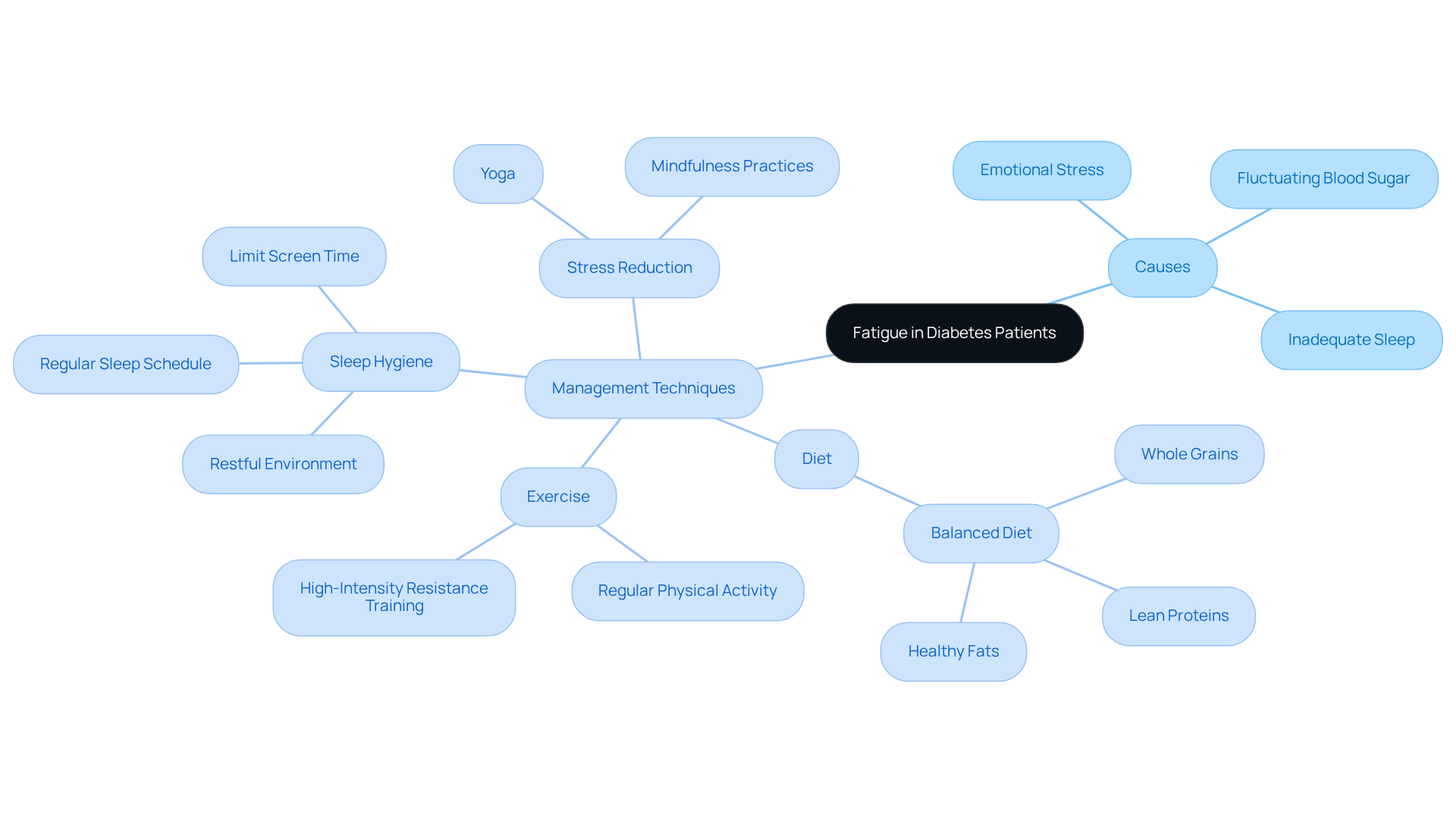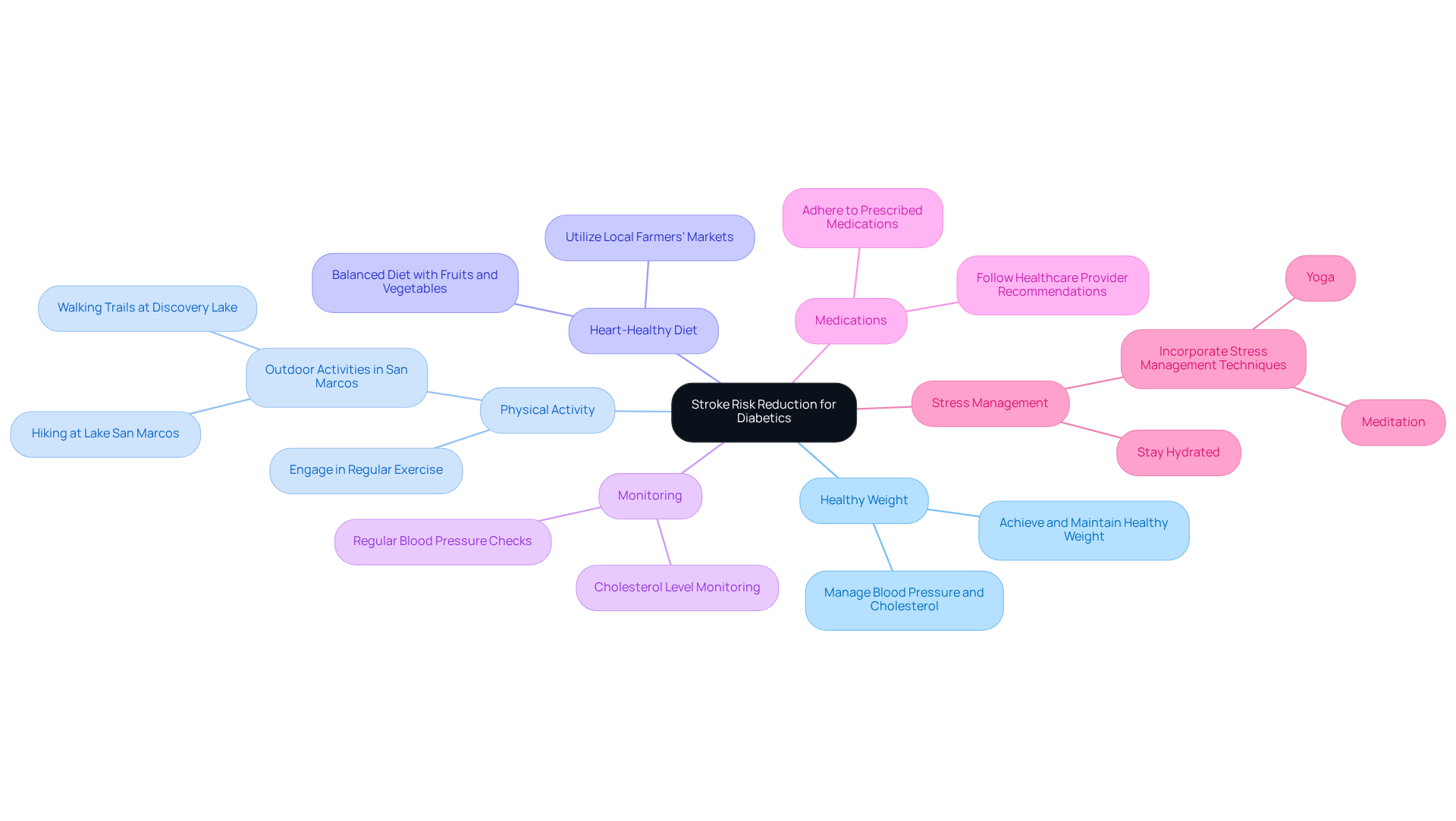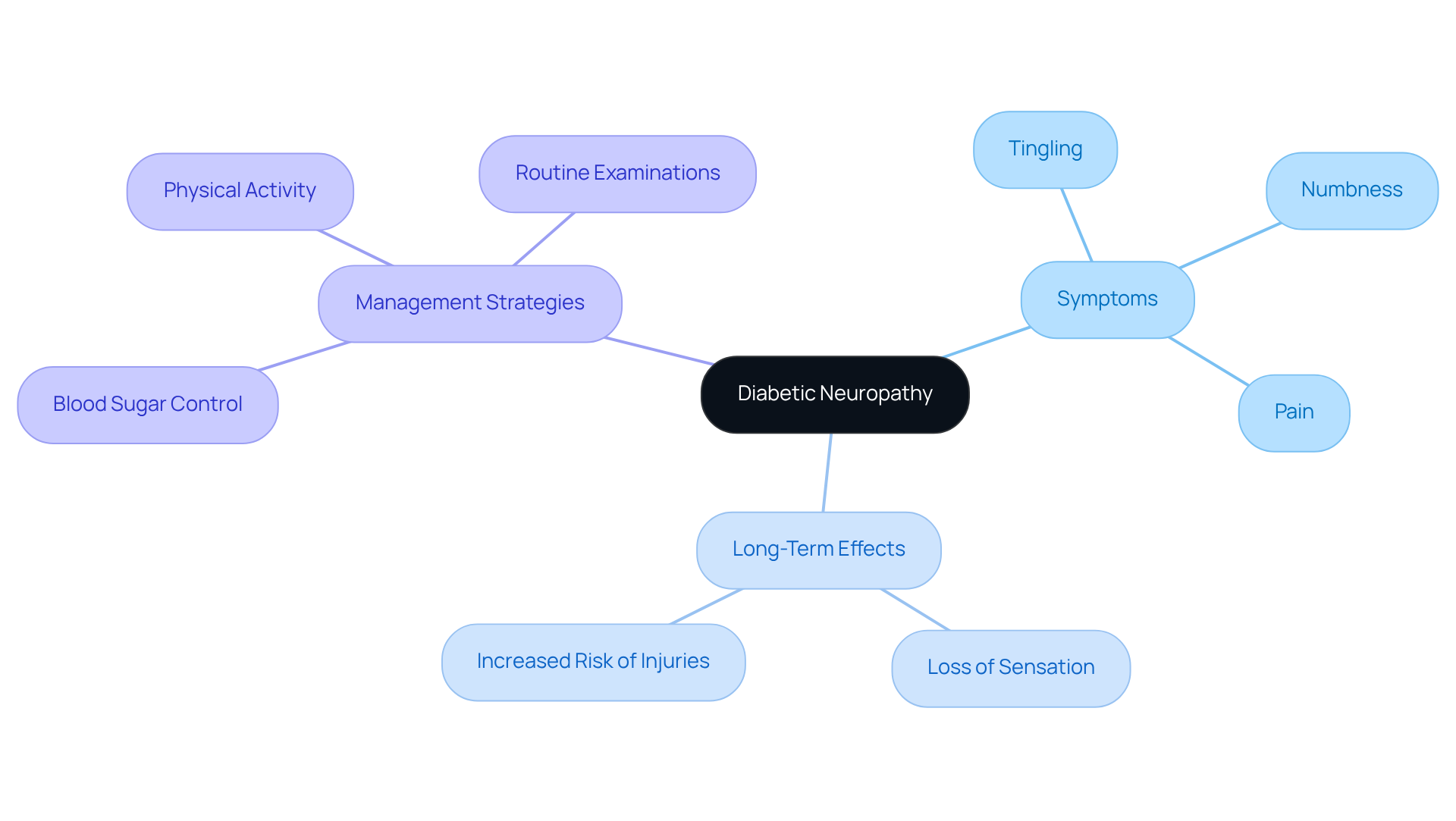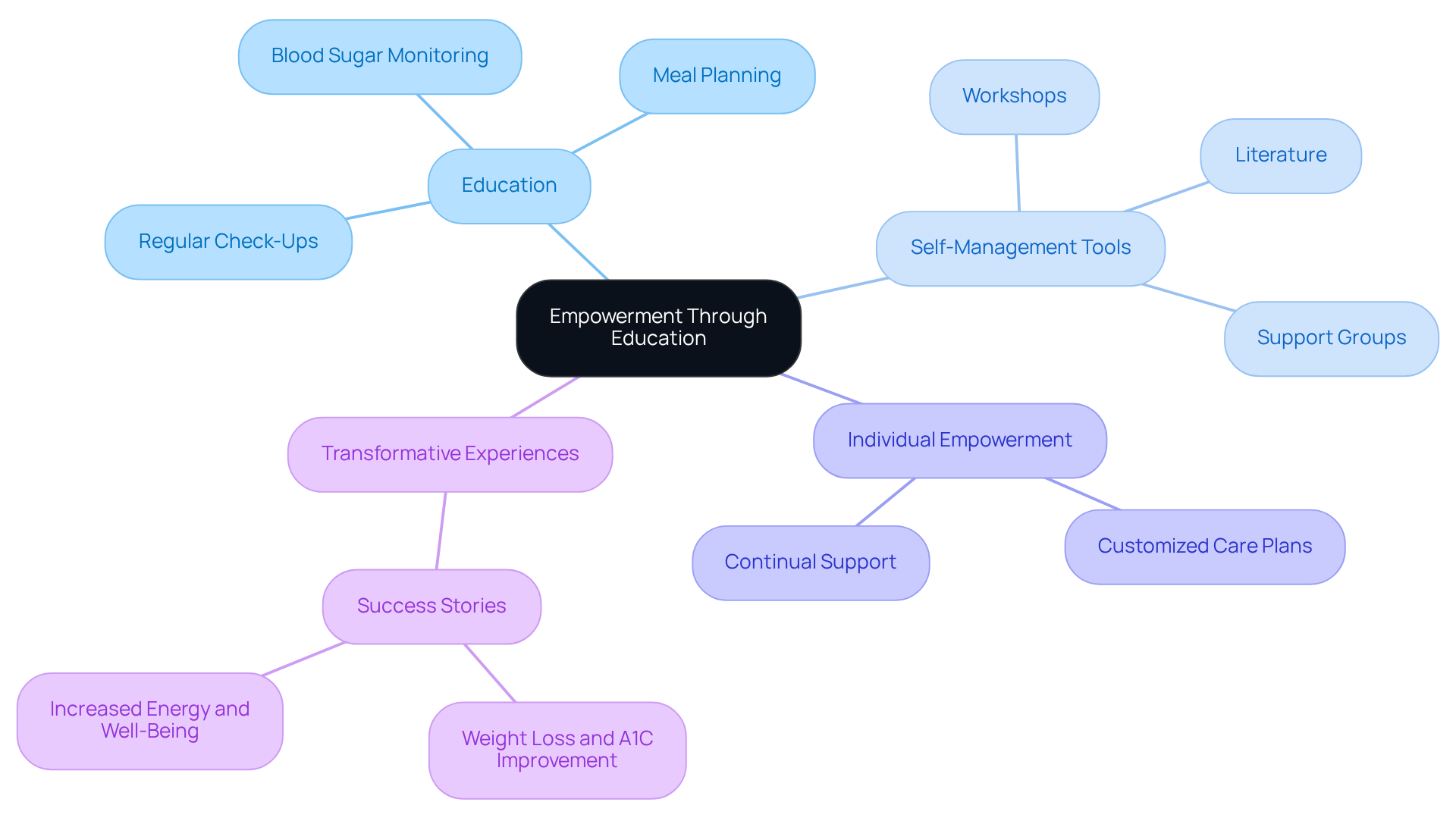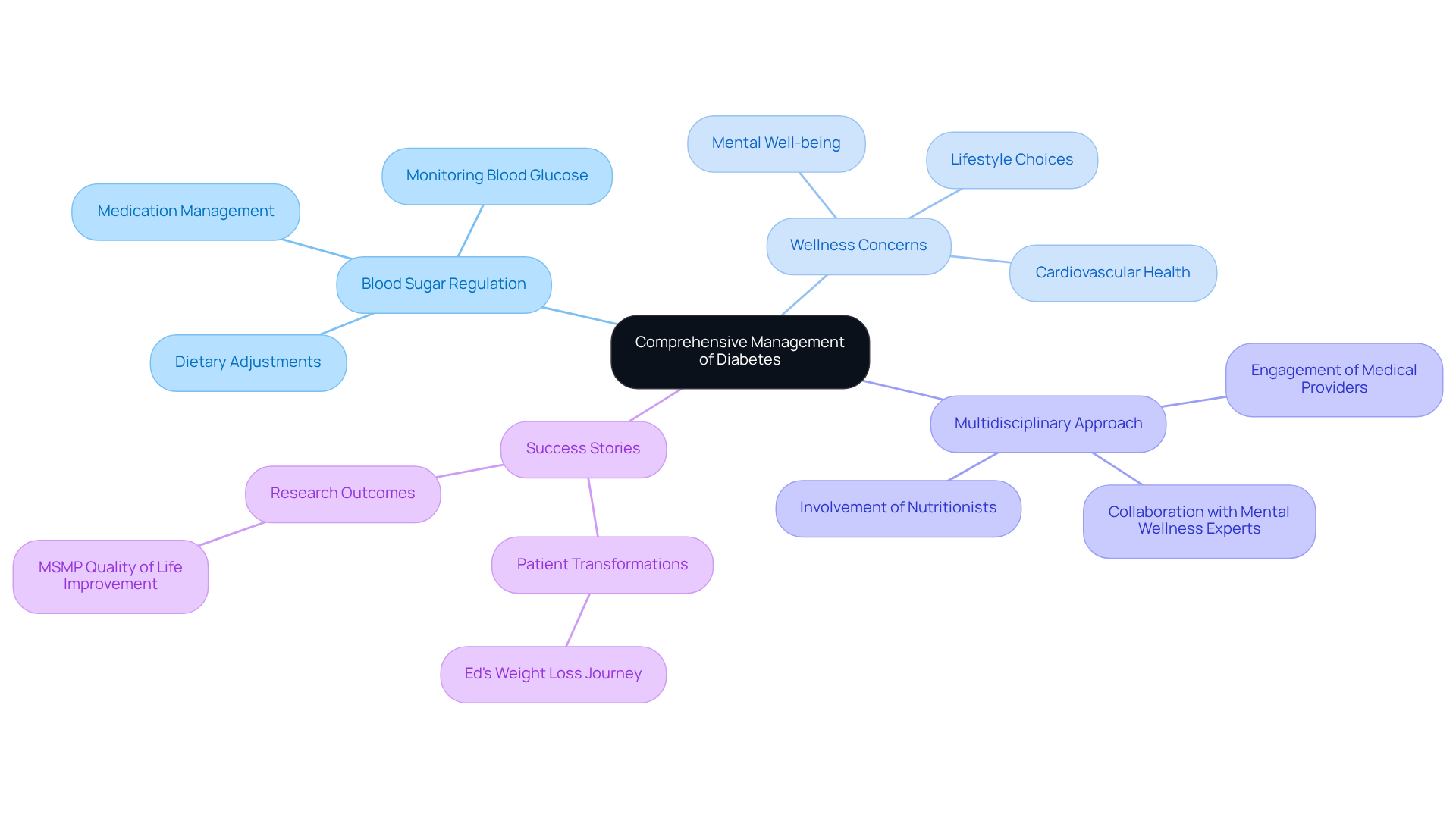Overview
This article addresses the various side effects of Type 2 diabetes and emphasizes the importance of managing them effectively. It’s crucial to recognize the challenges faced by those living with diabetes. Comprehensive management, including lifestyle changes, education, and personalized care plans, can significantly enhance health outcomes. Many patients find that such tailored approaches not only improve their well-being but also reduce the risks associated with diabetes-related complications.
Imagine how empowering it would feel to take control of your health. By embracing a proactive approach, you can pave the way for a healthier future. This journey may seem daunting at times, but remember, you are not alone. Support is available, and with the right strategies, you can thrive.
Consider joining the 30-Day Diabetes Reset program, designed to provide you with the tools and knowledge needed to manage your condition effectively. Together, we can work towards a healthier lifestyle that prioritizes your well-being and reduces the impact of diabetes on your life.
Introduction
Managing type 2 diabetes is not just about controlling blood sugar levels; it involves navigating a landscape of potential side effects that can significantly impact one’s quality of life. It’s important to recognize that these complications, ranging from foot ulcers to cardiovascular risks, can weigh heavily on your well-being. Understanding and addressing them is crucial for effective management.
This article delves into seven common side effects of type 2 diabetes and offers practical strategies for coping with them. Many patients find that empowering themselves in this journey helps not only in managing these challenges but also in reclaiming their health and vitality.
How can you take these steps toward a healthier, more vibrant life?
Integrative Wellness Center: 30-Day Diabetes Reset Program for Effective Management
Are you struggling to manage your diabetes effectively? The 30-Day Diabetes Reset Program at the Integrative Wellness Center is here to support you on your journey to better health. This transformative initiative is designed to empower individuals like you, offering personalized coaching, nutritional guidance, and tailored lifestyle modifications that cater to your unique needs.
It’s important to recognize that managing diabetes type 2 side effects can be quite challenging. By focusing on behavior change and sustainable practices, you will acquire the skills needed to control your blood sugar levels and enhance your overall well-being. Educational materials, including Dr. Shumard’s insightful books and engaging seminars, are integral to the program. They promote a deeper understanding of blood sugar management, paving the way for long-term success.
Many participants have experienced remarkable outcomes. For instance, one participant saw their fasting blood sugar levels drop from 293 mg/dL to 134 mg/dL after completing the program. This comprehensive approach not only addresses the diabetes type 2 side effects but also enables you to reclaim your well-being through informed choices and proactive lifestyle changes.
As Dr. Jason Shumard wisely states, “Ultimately leading to improved quality of life and reduced reliance on conventional medical interventions.” With nearly 20 years of experience in functional medicine, Dr. Shumard is dedicated to helping patients like you reverse their condition and regain control over their health.
Call 858-564-7081 today to discover how Dr. Shumard can assist you in restoring your health! The Integrative Wellness Center stands out as a leader in functional medicine, specializing in Type 2 blood sugar issues and hypothyroidism in San Diego. You deserve to feel your best, and we’re here to help you every step of the way.
Foot Ulcers: Understanding Risks and Prevention Strategies
Foot ulcers pose a significant threat for individuals with diabetes, often stemming from complications such as neuropathy and impaired circulation. It’s concerning to note that untreated or unhealed ulcers can greatly elevate the risk of severe outcomes, including non-traumatic lower-limb amputations. To reduce these dangers, maintaining excellent foot hygiene is crucial. This means:
- Washing your feet daily with warm water and mild soap
- Avoiding soaking
- Thoroughly drying them, especially between the toes
Wearing properly fitting shoes is equally important. Ill-fitting footwear can lead to blisters and injuries that may go unnoticed due to reduced sensation. Daily foot inspections are essential; take a moment to look for blisters, cuts, or signs of infection. Early detection can prevent serious complications. Additionally, managing blood sugar levels is vital, as elevated glucose can hinder healing and exacerbate foot problems.
Many patients find that incorporating lifestyle changes, such as regular walking, can significantly enhance overall wellness and vitality. To effectively start a walking routine, evaluate your current fitness level and establish realistic goals. For instance, committing to a daily walk of 10-15 minutes can make a big difference. For a structured approach, refer to the walking program PDF, which provides detailed guidance on developing a consistent schedule and tracking your progress.
It’s important to recognize that yearly foot examinations are significant for all individuals with blood sugar issues, especially those with contributing factors such as prolonged conditions, smoking, or pre-existing issues like nerve damage. Regular visits to a podiatrist can help identify potential issues before they escalate, allowing for timely intervention. Successful strategies for preventing foot ulcers include incorporating trans-epidermal water loss (TEWL) measurements into wound treatment standards. Research has shown that high TEWL is associated with a greater likelihood of ulcer recurrence.
By implementing these protective strategies and emphasizing foot care, along with tailored advice from Dr. Jason Shumard, individuals with blood sugar issues can greatly lessen their chances of developing foot ulcers and enhance their overall health results. For personalized assistance, consider contacting Dr. Shumard or accessing the walking program PDF to improve your management journey.
Cardiovascular Disease: Recognizing Symptoms and Risk Factors
Living with type 2 conditions can be challenging, especially with the increased risk of cardiovascular disease that often accompanies it. Symptoms like chest pain, shortness of breath, and fatigue can be concerning. It’s alarming to note that studies show over 30% of individuals diagnosed with diabetes will face heart-related issues. Factors such as high blood pressure, elevated cholesterol levels, and obesity contribute significantly to this risk, making it crucial to stay informed and proactive.
It’s important to recognize that managing these risks is vital for your health. Cardiologists emphasize the need for proactive measures, encouraging patients to embrace lifestyle changes that can make a real difference. Adopting a heart-healthy diet filled with fruits, vegetables, whole grains, and lean proteins, along with regular physical activity, can significantly lower the chances of developing cardiovascular complications. Many patients find that incorporating strength training two to three times a week can be particularly beneficial for managing blood sugar levels.
In San Marcos, CA, community wellness initiatives offer invaluable support for those facing these challenges. Programs like health education sessions and fitness groups not only provide personalized advice but also create a nurturing environment where participants can connect with one another. Expert insights suggest that addressing these challenges early can lead to improved health outcomes. For instance, a recent study revealed that aggressive management of heart-related risk factors can reduce the likelihood of heart attacks and strokes.
By focusing on education and empowerment, you can take charge of your well-being. Consider joining a local wellness program or fitness group to enhance your support network and stay motivated on your wellness journey. Remember, you’re not alone in this; there are resources and communities ready to help you thrive.
Vision Impairment: Importance of Regular Eye Check-Ups
Living with diabetes can be challenging, and it’s important to recognize the significant risks it poses to your eye health. One of the most serious conditions related to diabetes is diabetic retinopathy (DR), which can lead to irreversible vision loss if not identified promptly. In 2021, around 9.6 million individuals in the U.S. were living with DR, with 1.84 million facing vision-threatening forms of the disease. This statistic may feel overwhelming, but there is hope.
Regular eye examinations are essential for monitoring your eye health and catching any changes early on. Many patients find that scheduling comprehensive eye exams annually—especially after living with diabetes for several years—offers peace of mind. It’s crucial to maintain optimal blood sugar levels, as effective glycemic control can significantly reduce the risk of developing DR and help protect your vision.
Current guidelines from ophthalmologists highlight the importance of early detection and intervention. Proactive eye care is not just a recommendation; it’s a vital component of managing your diabetes. Remember, you are not alone in this journey, and taking these steps can lead to a healthier, brighter future.
Gum Disease: Connection to Diabetes and Oral Health
Gum disease, often known as periodontal disease, is a concern that affects many, particularly those with elevated blood sugar levels. It’s important to recognize that this condition can lead to increased inflammation and infection, which may triple the odds of developing severe gum disease. Did you know that nearly 90% of adults in the UK experience some degree of gum disease? This statistic highlights a common struggle that many face.
To support your oral health, consider adopting rigorous hygiene practices:
- Brushing twice daily with fluoride toothpaste
- Flossing regularly
- Rinsing after enjoying sugary foods
These simple steps not only improve dental health but also contribute to overall well-being. Additionally, arranging regular dental examinations is essential, as oral health is often overlooked in standard blood sugar assessments.
Managing blood sugar levels effectively is vital—not just for your overall health but also for reducing the likelihood of diabetes type 2 side effects, such as gum disease and its associated complications. Taking these proactive steps can empower you on your journey to better health. Remember, you’re not alone in this; many are navigating similar challenges, and together, we can work toward a healthier future.
Fatigue: Causes and Management Techniques for Diabetes Patients
Fatigue can often feel like an unwelcome companion for those managing this condition. It frequently stems from fluctuating blood sugar levels, inadequate sleep, and emotional stress. It’s important to recognize that unstable blood glucose can lead to significant energy dips, which contribute to feelings of exhaustion. To combat this fatigue, individuals can benefit greatly from maintaining stable blood sugar levels. A balanced diet rich in whole grains, lean proteins, and healthy fats, paired with regular physical activity, can make a world of difference. Many patients find that consistent exercise not only helps control blood sugar but also uplifts their overall energy levels.
In addition to dietary and exercise strategies, prioritizing sleep hygiene is essential. Establishing a regular sleep schedule, creating a restful environment, and limiting screen time before bed can significantly improve sleep quality, thus reducing fatigue. Have you considered incorporating stress-reduction techniques like mindfulness practices or yoga? These methods can be incredibly beneficial, as they help mitigate emotional stress, which is known to exacerbate feelings of fatigue.
Recent studies emphasize the significance of understanding the complex aspects of fatigue as it pertains to diabetes type 2 side effects in managing diabetes-related issues. Research shows that individuals who actively engage in lifestyle modifications, including dietary changes and stress management, report lower fatigue levels and an improved quality of life. By adopting these effective methods, individuals with blood sugar issues can significantly lessen fatigue and enhance their overall well-being. Remember, you are not alone on this journey; small steps can lead to meaningful changes.
Stroke: Understanding the Risks and Preventive Measures
Living with diabetes can be a challenging journey, and it’s important to recognize the heightened risk of stroke that comes along with it. This increased risk often stems from related conditions like high blood pressure and elevated cholesterol levels. In fact, studies indicate that individuals with diabetes may face a two to four times greater likelihood of experiencing a stroke compared to those without the condition. But there is hope! By adopting effective strategies, you can significantly reduce this risk and enhance your overall well-being.
- Maintain a Healthy Weight: Achieving and sustaining a healthy weight is crucial. It can help manage blood pressure and cholesterol levels, both of which play a vital role in stroke prevention.
- Engage in Regular Physical Activity: Regular exercise is not just about weight control; it’s also about enhancing your cardiovascular health. Many patients find that embracing the outdoor lifestyle in places like San Marcos, CA, can be invigorating. Activities like hiking at Lake San Marcos or walking the trails at Discovery Lake not only improve physical fitness but also boost insulin sensitivity and help control blood sugar levels.
- Follow a Heart-Healthy Diet: A balanced diet filled with fruits, vegetables, whole grains, and lean proteins supports your heart health and helps regulate blood sugar levels. In San Marcos, the vibrant farmers’ markets offer fresh, local produce that’s perfect for a diabetes-friendly diet. Seasonal fruits like avocados and berries, along with leafy greens, provide essential nutrients and fiber that can help keep your blood sugar in check.
- Monitor Blood Pressure and Cholesterol: Regular check-ups to monitor your blood pressure and cholesterol levels are essential. Keeping your blood pressure under 130/80 mmHg and managing cholesterol effectively can greatly reduce your chances of a stroke.
- Adhere to Prescribed Medications: It’s vital to follow your healthcare provider’s recommendations regarding medications for blood pressure, cholesterol, and glucose management. This adherence is a key step in reducing your stroke risk.
- Manage Stress and Stay Hydrated: Incorporating stress management techniques, like yoga or meditation, can improve your mental well-being and support better blood sugar control. Additionally, staying hydrated by choosing water or herbal teas instead of sugary drinks is essential for your overall health.
Recent research underscores the importance of these preventive actions. Lifestyle changes can lead to significant improvements in well-being for those managing blood sugar issues. Neurologists emphasize that proactively managing your blood sugar and related factors is crucial for reducing the chances of stroke and improving recovery outcomes should a stroke occur. By embracing these strategies, you can make meaningful strides in protecting your health and lowering your risk of stroke.
Nerve Damage: Symptoms and Long-Term Effects of Diabetes
Diabetic neuropathy can be a challenging experience, often presenting symptoms like tingling, numbness, and pain in the extremities, which are some of the diabetes type 2 side effects. It’s important to recognize that approximately 50% of individuals with diabetes type 2 side effects may face these issues over time. The long-term consequences of diabetes type 2 side effects can lead to a significant loss of sensation, which increases the risk of injuries and infections.
Many patients find that managing blood sugar levels within a healthy range is crucial. Inadequate glycemic control is a major contributor to nerve damage, making it essential to prioritize the management of diabetes type 2 side effects. Engaging in routine physical activity not only aids in blood sugar control but also enhances overall nerve function, which can be incredibly beneficial.
Furthermore, routine foot examinations are vital for early detection of potential problems. These check-ups allow for timely interventions that can prevent severe complications. By adopting effective management strategies, including lifestyle changes and utilizing educational resources, individuals can take charge of their health. This proactive approach can significantly reduce the risks associated with diabetic neuropathy, fostering a sense of empowerment and well-being.
Empowerment Through Education: Tools for Managing Diabetes Effectively
Enabling individuals through education is vital for efficiently managing diabetes type 2 side effects by providing them with essential knowledge and resources. It’s important to recognize that understanding blood sugar monitoring, meal planning, and the significance of regular medical check-ups forms the foundation of effective self-care. Many patients find that utilizing resources such as workshops, literature, and support groups significantly boosts their confidence and knowledge. Research shows that self-management education and support for blood sugar regulation can lead to an average decrease in hemoglobin A1C levels by 0.45-0.57% compared to standard care, highlighting the beneficial effect of education on wellness outcomes.
Moreover, effective individual empowerment strategies involve customized care plans and continual support, encouraging a proactive approach to managing the diabetes type 2 side effects. Dr. Jason Shumard emphasizes, “By offering individuals actionable insights and practical tools, the center cultivates an atmosphere where people can regain their well-being and vitality.” Transformative experiences shared by individuals demonstrate this impact:
- One participant noted, “I lost 55 lbs. My A1C started at 9.1; after 8 months, it is now 5.7,” showcasing the effectiveness of the center’s holistic approach.
- Another individual shared, “I feel so much better… I lost a lot of weight, have more energy, and feel great,” highlighting the positive changes experienced through the 30-Day Diabetes Reset program.
By utilizing these resources, patients can take charge of their well-being, leading to improved quality of life and decreased dependence on traditional medical interventions. To further enhance your journey, consider joining support groups or workshops offered at the Integrative Wellness Center. Together, we can navigate this path toward better health.
Comprehensive Management: Addressing the Multifaceted Impact of Diabetes
Managing this condition effectively involves not just regulating blood sugar levels, but also addressing related wellness concerns, such as cardiovascular health, mental well-being, and lifestyle choices. It’s important to recognize that a multidisciplinary approach—engaging medical providers, nutritionists, and mental wellness experts—can help create a personalized care plan tailored to individual needs. This comprehensive strategy ensures that every aspect of a person’s health is considered, ultimately leading to an improved quality of life and more effective management of the condition.
Many patients find that this holistic method does more than just alleviate symptoms; it seeks to uncover and treat the root causes of blood sugar issues and hypothyroidism. Dr. Jason Shumard, a specialist in functional medicine, emphasizes this philosophy. Transformative stories, like Ed’s remarkable journey of losing 55 pounds and reducing his A1C from 9.1 to 5.7, showcase the potential of this approach.
Research supports these experiences, indicating that the Multidisciplinary Self-Management Program (MSMP) significantly enhances quality of life, with a mean rank of 52.49 compared to 41.01 for usual care (p = 0.026). By prioritizing a well-rounded care model, patients can not only manage diabetes more effectively but also reduce the risk of diabetes type 2 side effects that are associated with the disease. If you’re looking to improve your health, consider how a supportive, multifaceted approach could be the key to your success.
Conclusion
Managing type 2 diabetes involves much more than simply monitoring blood sugar levels; it requires a comprehensive approach that addresses the multifaceted side effects and complications associated with the condition. It’s important to recognize that navigating the challenges of diabetes can feel overwhelming. However, through effective strategies and educational resources, individuals can empower themselves to enhance their overall health.
Many patients find that personalized care plans, regular medical check-ups, and lifestyle modifications—such as physical activity, dietary changes, and stress management—are crucial. Each of these elements plays a vital role in mitigating the risks of complications like cardiovascular disease, vision impairment, gum disease, and nerve damage. By prioritizing proactive measures and seeking support from healthcare professionals, individuals can significantly improve their quality of life.
Ultimately, the journey to better health in managing diabetes is one of empowerment and education. Taking the initiative to learn about the condition and engage in supportive programs can lead to transformative outcomes. Whether through community initiatives, workshops, or personalized coaching, the tools for effective diabetes management are available. Embrace the opportunity to take control of your health. Remember, every small step can lead to significant improvements in your well-being.
Frequently Asked Questions
What is the 30-Day Diabetes Reset Program at the Integrative Wellness Center?
The 30-Day Diabetes Reset Program is a transformative initiative designed to support individuals in managing their diabetes effectively through personalized coaching, nutritional guidance, and tailored lifestyle modifications.
What are the key components of the 30-Day Diabetes Reset Program?
Key components include behavior change strategies, educational materials, personalized coaching, and insights from Dr. Shumard’s books and seminars to promote understanding of blood sugar management.
What outcomes have participants experienced from the program?
Many participants have reported significant improvements, such as a notable drop in fasting blood sugar levels; for example, one participant’s levels decreased from 293 mg/dL to 134 mg/dL.
Who leads the 30-Day Diabetes Reset Program?
The program is led by Dr. Jason Shumard, who has nearly 20 years of experience in functional medicine and is dedicated to helping patients reverse their conditions and regain control over their health.
What are foot ulcers and why are they a concern for individuals with diabetes?
Foot ulcers are serious complications for individuals with diabetes, often caused by neuropathy and impaired circulation, and can lead to severe outcomes like non-traumatic lower-limb amputations if untreated.
How can individuals with diabetes prevent foot ulcers?
Prevention strategies include maintaining excellent foot hygiene, wearing properly fitting shoes, conducting daily foot inspections, managing blood sugar levels, and having yearly foot examinations by a podiatrist.
What lifestyle changes can enhance overall wellness and prevent foot ulcers?
Incorporating regular walking into one’s routine can significantly improve overall wellness. Starting with a daily walk of 10-15 minutes is recommended, along with using structured programs for guidance.
What symptoms indicate a risk of cardiovascular disease for individuals with diabetes?
Symptoms to watch for include chest pain, shortness of breath, and fatigue. Over 30% of individuals diagnosed with diabetes may face heart-related issues.
What lifestyle changes can help manage cardiovascular disease risk factors?
Adopting a heart-healthy diet rich in fruits, vegetables, whole grains, lean proteins, and engaging in regular physical activity, including strength training, can lower the risk of cardiovascular complications.
How can community wellness initiatives support individuals managing diabetes and cardiovascular risks?
Community wellness initiatives provide health education sessions and fitness groups, offering personalized advice and a supportive environment for individuals to connect and enhance their wellness journey.
